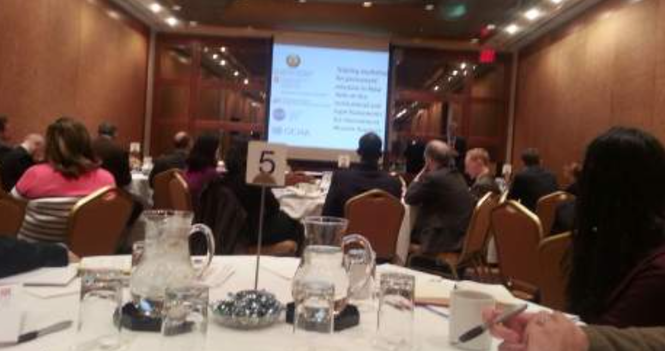
On March 7, representatives from 29 permanent missions in New York convened for a training and informal discussion on the institutional and legal frameworks on international disaster response. This event, the first of its kind in New York, was hosted by the Permanent Missions of Switzerland and Mozambique and organized by the “Disaster Response Dialogue,” a joint initiative of the Swiss government, the International Federation of Red Cross and Red Crescent Societies, the United Nations Office for the Coordination of Humanitarian Affairs and the International Council of Voluntary Agencies.
“The 2000 floods in my country were a wake-up call for us,” Mozambique Ambassador António Gumende informed participants, “we realized that we had to improve our laws and institutions for disaster response, including for international assistance.” Improvements made since then had demonstrably saved lives in renewed floods this year, but work on a comprehensive law was still on-going and Mozambique’s interest in hosting this event was to learn from others’ experiences and contribute its own to debates about the development of the international system.
For his part, Swiss Ambassador Paul Seger noted that, as a country with a strong humanitarian tradition, Switzerland was committed to seeing that disaster aid gets to people in need as quickly and effectively as possible. This event was an important opportunity for the diplomatic community to take identify the gaps in the current international and legal framework. “We need to work better so aid providers and receiving states truly work hand-in-hand,” he asserted, “your discussions here can save lives in the future.”
Participants reviewed the evolution of the international humanitarian coordination system, existing international legal frameworks for disaster response, and standards for the quality and accountability of humanitarian aid. These were weighed against practical problems reported from recent operations, including perceived “trust gaps” between international aid providers and domestic authorities, regulatory bottlenecks and oversight gaps in the delivery of relief, and frustrations about the quality and complementarity of the aid provided by some actors. Jeremy Collymore, head of the Caribbean Disaster and Emergency Management Agency, shared experience from his region, noting some remaining gaps between global and regional efforts at coordination and highlighted the shared responsibility of all international actors to support national efforts. “Our assistance should not become a burden on national authorities,” he warned.
Participants endorsed the need to build a wider dialogue on these issues among all states and the humanitarian community. A number of participants expressed disappointment with the scattered and incomplete nature of existing international legal frameworks for disaster response, calling for consideration of efforts to harmonize and strengthen them. They acknowledged, however, that succeeding in this would be politically challenging. At the same time, the importance of effective domestic rules and procedures for international relief was emphasized. Likewise, several participants identified a need for more respect for, and greater integration of, regional organizations and initiatives in the development of the global system.
It was noted that the United Nations is currently planning a “Global Humanitarian Summit” for 2015 and it was recommended that the themes identified at this meeting should be further developed for action at that event.